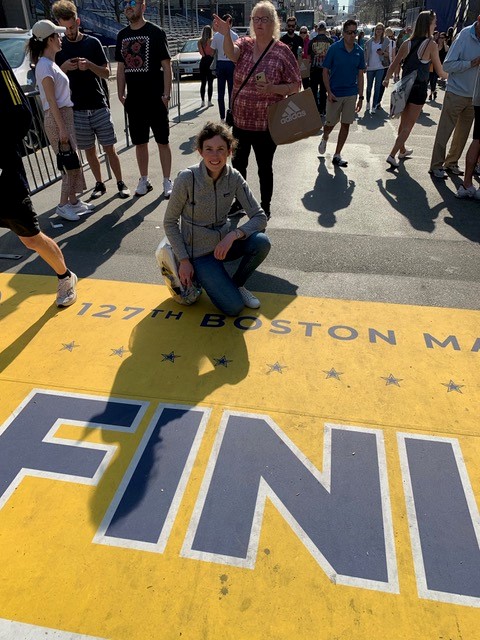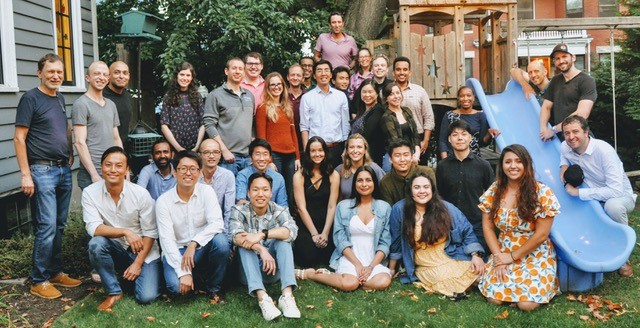Career Booster North America: Interviews with German researchers in the USA and Canada

At the finishing line of the Boston Marathon, but before the race
© Privat
DFG: “Faster than required for your age group” – that was also how the reviewers commented on your proposal for a research fellowship. Do you normally like to stay at the top of your peer group?
JS: If it does happen, it tends to be unconscious. Running is an individual sport anyway, and in a marathon it’s more about training consistently and getting to the finishing line rather than being too focused on the results table.
DFG: But looking at your CV as a kind of results table, you clearly did extremely well in your school-leaving examinations and were above average in your university studies, too. Was your decision to study medicine the inevitable consequence of passing your university entrance qualification with top grades?
JS: Yes and no. Since I was doing well at school, I was allowed to take part in a special academic talent promotion programme in the summer before taking my school-leaving exams – the Deutsche Schüler Akademie – so this gave a me a taste of what it’s like to study at university, and I gained insights into various subjects and careers, one of which was medicine. But based on my family background I really ought to have ended up doing law like my younger sister, or something financial like my brother, who’s younger still. In upper school – even though I attended Albert-Einstein-Gymnasium in Sankt Augustin – I was not particularly interested in science in fact: I actually tended more towards languages, or let’s say general interests. I wanted to study something I was really interested in, and during a nursing internship after my school-leaving exams I was able to gain some idea of how multi-faceted a degree in medicine would be. I then started in Bonn and quickly came to enjoy the curriculum I followed for the preclinical part of my medical training. In fact things are quite a bit tougher in the preclinical phase than at secondary school, so people bond pretty quickly as everyone has to go through the same mill together – especially in practicals and before oral exams, where some of the lecturers expect an awful lot of detailed knowledge.
DFG: During your medical studies proper you then left your home region of Bonn and Sankt Augustin for the first time and went to Oslo instead. How did you end up there?
JS: A mixture of curiosity and the EU’s Erasmus programme. Norway is quite a small country in terms of population, but it's big in terms of surface area and natural beauty – and the widespread distribution of the population is something that medical care provision has to take account of. There’s a lot of practice for this at medical school: every doctor has to be able to deal with the most common symptoms. I was there for six months and, having taken a language course, I was at least able to say a few words in Norwegian when asked for directions in the street or spoken to in Norwegian after a fall while cross-country skiing – a sport I took up there like many exchange students do.
DFG: And you probably took some warm Norwegian jumpers with you to the UK, your next stop abroad?
JS: Actually no, because the Exeter Oncology Centre at the Royal Devon and Exeter Hospital is situated in the milder south-west of the country. I went there for a month in September 2013 to do a clinical traineeship, working in the radiation oncology department.
DFG: So that was after you’d decided to specialise in oncology, was it?
JS: Yes, oncology has been my focus ever since 2011, when I started my doctoral studies under Professor Perner at the Institute of Pathology at Bonn University Hospital, which is where I also obtained my doctorate in 2015 with a thesis in the field of prostate carcinoma research. During the practical year, i.e. after the second part of my medical training, I went to Pittsburgh for two months to the Mario Lemieux Center for Blood Cancers and Hillman Cancer Center at the University of Pittsburgh. This connection came about through the Centre for Integrated Oncology at the University Hospitals of Cologne and Bonn. In Pittsburgh I got to know and love the profession of the physician-scientist, i.e. doctors who are involved in research as well as patient care. In North America, you can easily recognise them by the fact that they hold two academic degrees – Medical Doctor (MD) and Doctor of Philosophy (PhD), though there are also successful physician-scientists who “only” have an MD or a Dr. med. on their door sign.
DFG: At the end of 2020, you went to Boston to pursue a project at Benjamin Ebert’s lab that to the non-expert looks more like cardiology than oncology. What’s the connection there?
JS: Here I need to go into a little more detail: firstly, there are research results that have been causing quite a sensation in life science circles for about ten years under the acronym “CHIP”. These describe the acquired genetic changes in blood-forming (haematopoietic) cells with increasing age. Potentially – but not necessarily, and only under certain conditions and via various mechanisms – these can lead to very differing symptoms including, obviously, blood cancer such as acute leukaemia, but also cardiovascular diseases. Research into CHIP can help gain a better understanding of how ageing processes are linked to the genetic changes they may entail. In fact I originally came to Boston with a project on the causality between CHIP and cardiovascular disease, but the pandemic upset my plans in that a very similar project started at the same time as I was planning to start my own research – a paper on that is due to be published soon. This shifted the focus of my project, but the field is large and there are still all kinds of unresolved issues, such as to what extent environmental factors influence the expansion of haematopoietic cells with CHIP mutations.
DFG: What exactly are you doing at the moment and are there any initial findings?
JS: I’m trying to understand why certain CHIP mutations, as well as many cancers, including blood cancers such as myelodysplastic syndrome, occur at different rates in men and women. Mutations in the gene DNMT3A, for example, the most frequently mutated gene, are more common in women than in men. There are indications that sex hormones could play a role here, and I’m currently investigating this using mouse models.
DFG: Three years ago, in the comments on your proposal, reference was made to your lack of experience in working with mouse models. Have you been well supported at the Ebert lab?
JS: Yes, the lab has a lot of experience of mouse models and people are extremely supportive so even somewhat less experienced researchers can work very effectively right away. For the work with mouse models, Marie McConkey is the mainstay in the lab as a senior scientist, helping not only with induction but also with the planning and implementation of experiments as things progress, which makes the results more comparable.

Group photo of the lab by Ben Ebert
© Privat
DFG: Where will your career go from here? Where do you see yourself in five years’ time?
JS: My DFG research fellowship expires at the end of April. After that, it will certainly take me six months to prepare the data and another six months to publish. I’ll certainly get support from the Ebert lab for that, and then we’ll see. I still have to complete my medical specialist training in Germany, which will also take another year. I’m probably already too old academically for the relevant junior research group funding programmes, so I won’t be applying for them now, and I don’t even know yet on which side of the Atlantic I’m going to take my next steps towards becoming a physician-scientist. My time here in Boston has confirmed one thing, however: I’d like to aim for as international an environment as possible, perhaps as international as the field of participants in the Boston Marathon – for which I soon hope to be holding a certificate of participation in my hands!
DFG: What kind of time would you like to see on your certificate and how have you prepared for the race?
JS: My goal is to run faster than 3:30 hours – how much faster depends on my form on the day and external circumstances. But it's bound to be an unforgettable experience, regardless of my time. During the peak phase of my training I manage 80-90 kilometres a week, spread over several runs along the Charles River during the week and then a longer run of up to 32-35 kilometres at the weekends, at this point also including climbs – unlike along the Charles River. Otherwise, Heartbreak Hill will be sure to live up to its name – that’s one of the notorious Newton hills in the second half of the marathon route.
DFG: Talking of potential failure on a Heartbreak Hill – is that ever a question you ask yourself with regard to your professional situation?

View from the training track over the Charles River
© Privat
JS: Absolutely, because that’s a challenge, too. But like the Boston Marathon itself, I like challenges because I really enjoy what I’m doing and of course you can learn from setbacks, too. However, I suspect your question is looking beyond that at a kind of structural comparison between the Boston Marathon and an academic career path. If you were looking to compare the two, you might say that both are endurance sports – admittedly in more of a figurative sense in academia – and both have measurable qualification criteria.
DFG: Could you have imagined yourself taking up something else?
JS: My dream job as a physician-scientist only emerged in the course of my medical training which, as I already said, I chose because I think it’s very multi-faceted and you never stop learning in medicine. I also mentioned my family background, which was more oriented towards law, and now, looking back, I’m absolutely satisfied with the path I took.
DFG: Pursuing this path successfully might possibly require a degree of “self-promotion”. Is that something you feel comfortable with?
JS: Not really, because I’m actually much more reserved than I might appear in an interview – so reserved that I actually sometimes used to get marks taken off at school due to lack of oral participation in class. I was more interested in written work – and I was always much in demand in all kinds of subjects under the peer tutoring programme at school.
DFG: If you had time to spare over and above your academic work and running training, how would you spend it?
JS: I cycle a lot and love to travel, so I love exploring new places near and far. And during my time as an assistant physician in Freiburg, I finally got around to taking piano lessons. I got out of practice for a while but have now taken up playing again without any great ambitions – not least motivated by the example of a senior physician who was supervising me in Pittsburgh and whom I met again years later by chance at a meeting of the American Society of Hematology (ASH). And since my current instrument is an electronic keyboard that allows me to use headphones, I manage to avoid being exposed to any potentially critical listeners!
DFG: One final question: what makes you laugh most?
JS: The jokes told by my two siblings.
DFG: In that case, thank you very much for this interview and we wish you all the very best for your future career and the upcoming Boston Marathon. May you achieve the result you are hoping for!